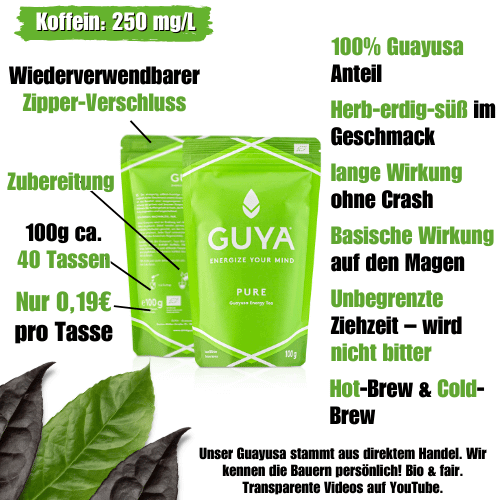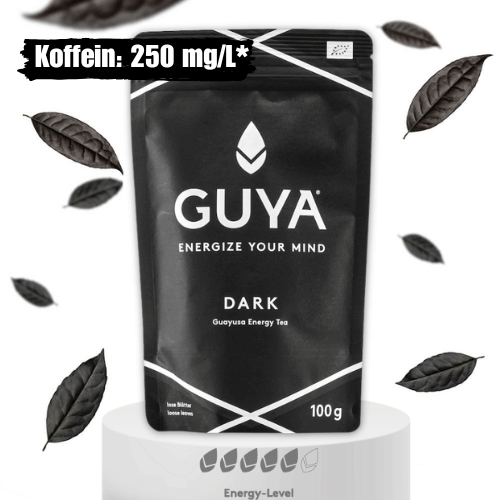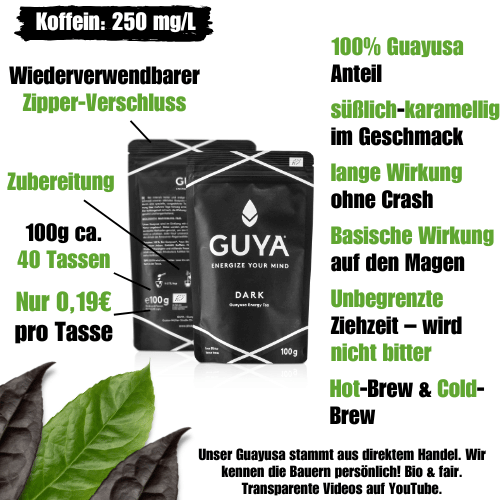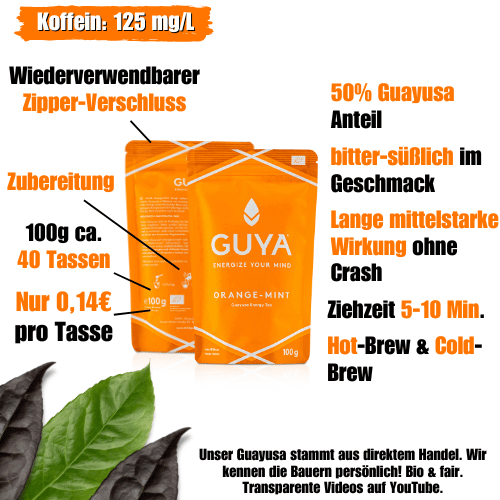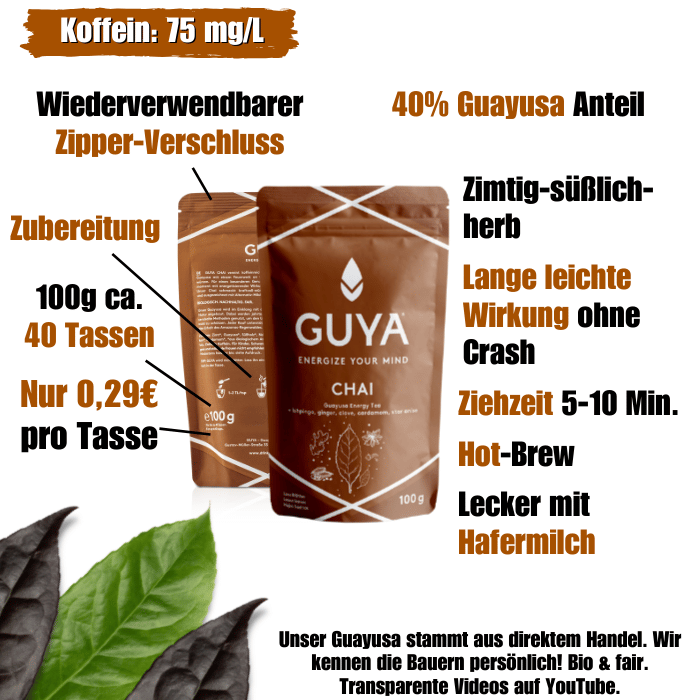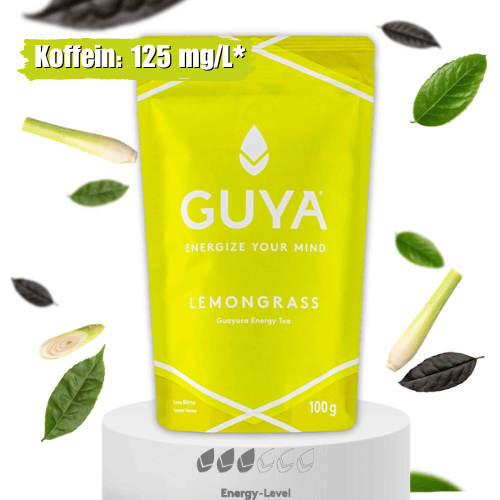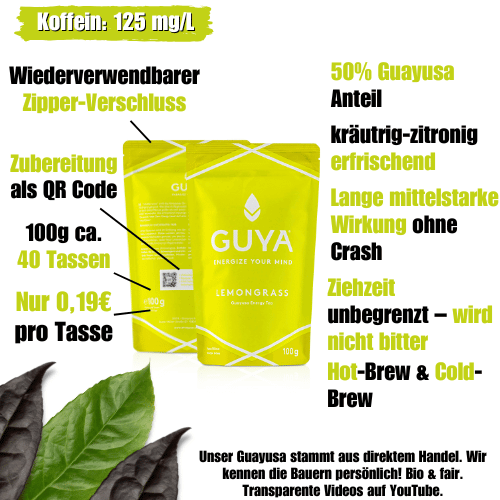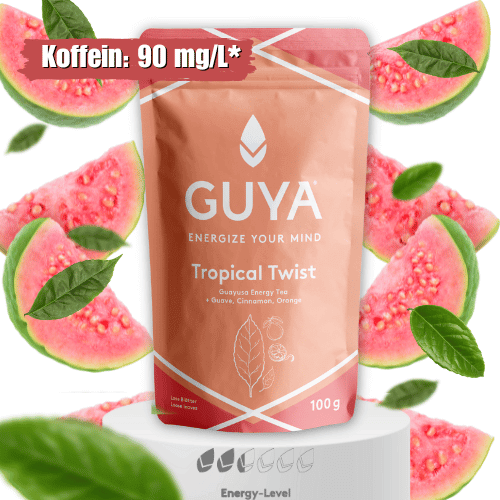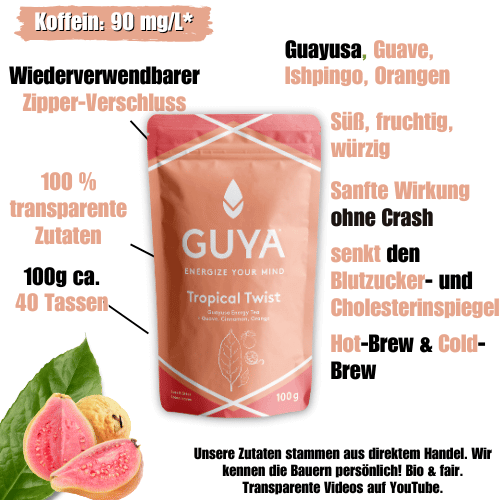Caffeine effect, overdose, withdrawal, pregnancy & more

Introduction
Caffeine is one of the most famous ingredients of plants and drinks. Most people are also aware of the effects of caffeine, but what triggers this effect and how it is on our body, general health and pregnancy, very few are familiar with that. In this article we therefore give you a detailed overview of the alkaloid and shed light on the side effects of caffeine, possible withdrawal and what can happen with an overdose.
Contents
- What is caffeine?
- Discovery and occurrence
- Caffeine effect
- Caffeine pregnancy
- Caffeine and breastfeeding?
- Caffeine side effects
- Caffeine dependency
- Caffeine withdrawal
- Which tea has how much caffeine?
- Conclusion
1. What is caffeine?
Caffeine is one alkaloidthat is found in over 60 different plants. It mainly stimulates the cardiovascular system and central nervous system. The effect is noticeable through increased cognitive skills, attention and focus.
Pure caffeine powder Has a white color and crystalline shape. It tastes extremely bitter and is therefore only used as an additive in industry. You can find it z. B. in most energy drinks. Even in Bio Energy drinks If you find it, always check the list of ingredients if you are on extracted caffeine z. B. want to do without the effect.
2. Discovery and occurrence
Caffeine was discovered in 1820. Of course, the effect was known through coffee and tea before, but science, strictly speaking Friedlieb Ferdinand Runge, managed to insulate the active ingredient for the guilty effect just 150 years after the first coffee import.
The "tea" in tea (green tea (Matcha), black tea, white tea, etc.) is also caffeine. However, it was discovered 7 years later and called tea according to tea.
3. Caffeine effect
The "waking effect" which triggers caffeine is strictly speaking a "non-tired company effect". It has a structure similar to the neurotransmitter adenosine, which makes us tired or is responsible for the production of the sleep hormone melatonin.
Due to this similarity of structures, the caffeine molecy can dock to the receptors, which would actually be used by adenosine, and thus prevent it from occurring.
In our articles too Pretend and Side effects Let's get more detailed.
3.1. Caffeine per day - daily dose
Caffeine is actually a nerve poison, that sounds very dangerous at first, but it is not in the end. More on this in Section side effects.
In order to feel the optimal effect of caffeine, it is advisable to experiment something yourself, because everyone reacts a little differently and accordingly the best amount per day is different from person to person.
In general, as a good starting point, you can follow the following rule of thumb from Federal Office for Risk Assessment For a daily dose, remember caffeine:
- A daily dose of 400 mg is classified as absolutely harmless. That corresponds to about 7 cups Guayusa Tea.
- When taking a large dose of caffeine within a short time, the BfR 200 mg sees as a limit in order not to suddenly strain the body with a kind of overdose. That corresponds to 3 to 4 large cups Guayusa Tea.
- During pregnancy there are slightly different guidelines for the consumption of caffeine. More on this below or detailed here.
3.2. Half -life, time of action, duration of action
The half -life of caffeine and its effect is often a matter that is hotly discussed by many people. The decisive factor here is clearly the distinction between the chemically seen half -life and the time of action or duration of action, which we actually feel.
The half -life of caffeine in the body, i.e. the time until the amount in the body has halved due to dismantling, is loud EFSA Between 2 and 8 hours. Other sources go from 1.5 hours to 9 hours.
This in turn does not mean that you actually still notice the effect of caffeine after one, two or three hours. You can already feel tired, although you still have 90% of the active ingredient in the body, but you can also feel completely opened, even though 90% have already been broken down.
The time of action or duration of caffeine depends heavily on your personal tolerance. It takes a long or short or short time for it to lose its effect.
The caffeine impact curve therefore looks like this with a four-hour half-life. We go into it in great detail in our Comparison of artificial and natural caffeine.
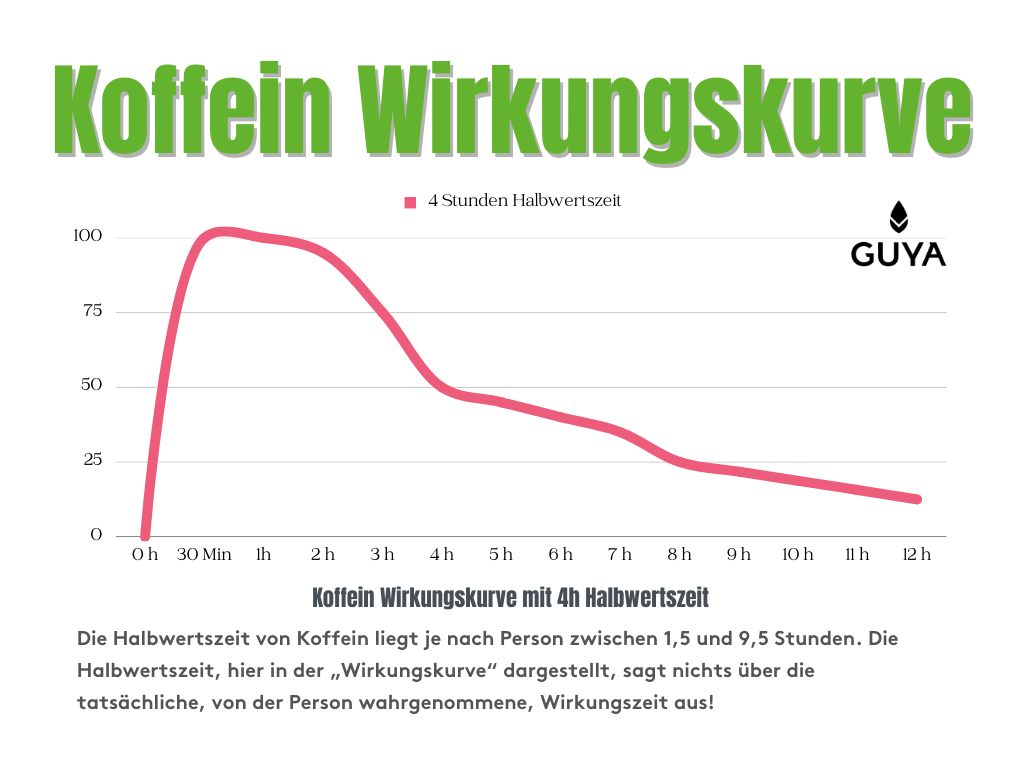
3.3. Blood pressure
How does the consumption of caffeine affect blood pressure? The answer to this is not quite as easy to give, because it depends on the form in which you consume it.
Natural caffeine from plants looks different from artificial or extracted. Even the consumption of different plants looks different, since many other active ingredients can play a role here. A detailed description of these differences can be found in our article on Experience in caffeine in Guayusa.
You can find more information about individual active ingredients that often occur in caffeinated plants in our overview "These ingredients give you limitless energy“.
In this article we therefore remain a little more general:
- In a natural form by drinking coffee, Guayusa, Tea, mate or guarana has the alkaloid for high blood pressure affected no negative effects. The blood pressure only skyrocketes, and only for a short time if no caffeine has been consumed for a long time.
- Artificial or extracted caffeine, on the other hand, can have a negative effect on blood pressure. It can let the blood pressure snap up and thus lead to problems.
- Guayusa Has blood pressure regulating effect, since the active ingredient L-theanin is also included.
3.4. Headache
Another positive effect of caffeine is the reduction of pain, especially that of the headache! The effect can be traced back to a blocking function, this time from enzymes! This blocking produces the hormone prostaglandin to a lesser extent and can reduce its task, the pain transfer in the brain.
Also home remedies such as coffee or Guayusa According to a study by the University of Freiburg, lemon should help against headaches.
3.5. ADHD
At People with ADHD can quickly lead caffeine to hyperactivity. Paradoxical phenomena, how this becomes sleepy, are also possible. However, there are no uniform scientific statements.
However, we always get the feedback from our customers that they Guayusa, unlike coffee, helps with their ADHD symptoms and that although Guayusa The most caffeinated drink in the world is.
3.6. Health
Caffeine has some advantages for health. We will not respond to everyone down to the smallest detail, but call the most important. In a separate part to the Pretend We specifically go into this for health.
- Reduction of the Type 2 diabetes risk
- Up to 25% lower Stroke risk
- Up to 49% lower risk of cancer
- Lower Risk kidney stones to get
- Up to 20% lower Skin cancer risk
- protection against cataract
- Improvement of the Long -term memory
- Lower Alzheimer's risk
- Lower Parkinson's risk
- Increased Brain function
- Increase in performance in sports
- Higher alertness
- Improved/increased metabolism
Then we take a closer look at the increase in performance in sports and work.
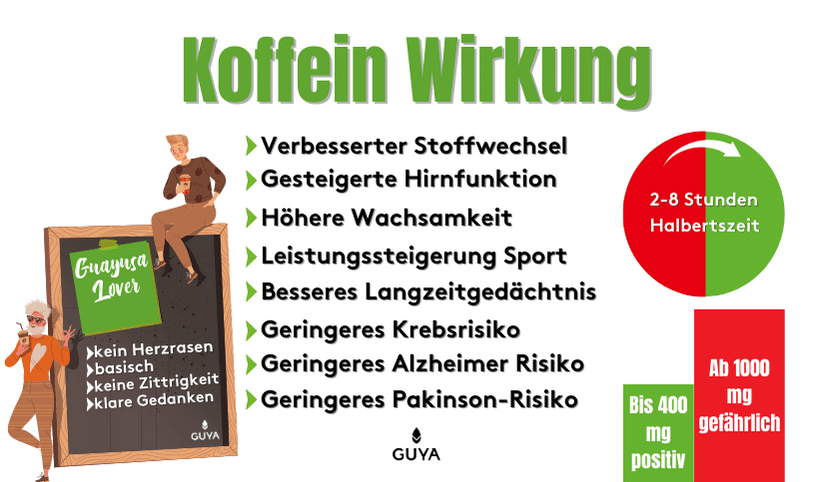
3.7. Sports - caffeine before sport
The caffeine effect has proven to be absolutely performance -owners. With a dose of 3 to 6 mg per kg body weight, according to one study the best level of performance are.
This includes all kinds of types of effect, such as muscle strength, endurance, jumping power, sprint and movements.
The caffeine dose should be taken about 60 minutes before training. However, it also depends on the type of active ingredient. Extracted, pure caffeine powder, Hit faster than a coffee, which in turn works faster than Guayusa.
3.8. Work
For work, and here we assume mental, i.e. headwork, the active ingredient offers a lot of positive Characteristics.
- alertness
- concentration
- Mood
- Limitated depression
- motivation
4. Caffeine pregnancy
The fear of the Germans of caffeine during and after pregnancy is widespread. The Study situation If it is not clear, some studies come to the conclusion that consumption of up to 200 mg per day does not represent any problems, other Again, a reduced growth of the baby assumes during pregnancy.
The BfR assumes that a consumption of 200 mg has no negative effects over the day. The WHO sees 300 mg as a guideline.
So if you want to be on the safe side, reduce your consumptionCaffeine-Drinks during pregnancy. As always, the dose makes the poison. A cup of coffee, tea, or Guayusahas hurt anyone yet. We have the topic in another Contribution illuminated in detail.
5. Caffeine and breastfeeding?
Even during the Breastfeeding Put the drinking of a few cups Guayusa, Tea or coffee, no problems. However, energy drinks should be avoided.
It is also important to know that breast milk has the highest content of caffeine about 1 hour to 2 hours after consumption. Therefore, plan as well as possible and drink a cup of your favorite guard maker either immediately after breastfeeding or in front of breastfeeding to keep breast milk as possible.
In order to keep breast milk completely free of caffeine during breastfeeding, you have no choice but to do without it.
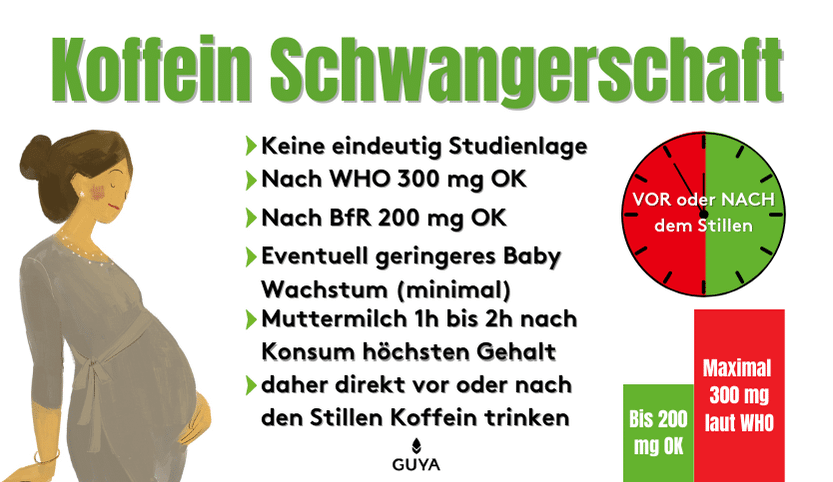
6. Caffeine side effects
After all the positive properties, we have the side effects of caffeine illuminate.
6.1 Caffeine overdose
The dose makes the poison! It is considered absolutely harmless to consume a daily dose of approx. 400 mg.
More than this 400 mg to consume over a long period of time, however, can lead to some unpleasant side effects.
A life -threatening dose can only be expected from 1,000 mg of caffeine. Most of the time, however, there is rather an extremely unpleasant side effects than a really fatal overdose.
Symptoms of too much caffeine
Side effects or unpleasant symptoms of a caffeine overdose can be the following.
- depression
- anxiety
- Sleep disorder
- Cardiovascular problems
- Reinforcement of existing ones gout
- Headache
- Shakyness
In our article too Side effects of caffeine Let us go into more detail on the individual symptoms of an overdose.

Too much caffeine what to do?
First of all, it should be mentioned that even a caffeine overdose is not a high probability of life! As with two or three alcoholic drinks, too much, the caffeine cat has to be easily cure. This is best done by:
- Don't drink more caffeine;)
- take a walk in the fresh air,
- even and deeply breathe,
- Drink a lot of water,
- Possibly drink water with extra electrolytes.
The side effects of a small caffeine overdose should subside within 4 to 6 hours. If you have actually consumed to the 1,000 mg or more, look for a doctor, who can give you additional liquid via a drip. You can find even more information, as already written, in our Article on caffeine side effects.
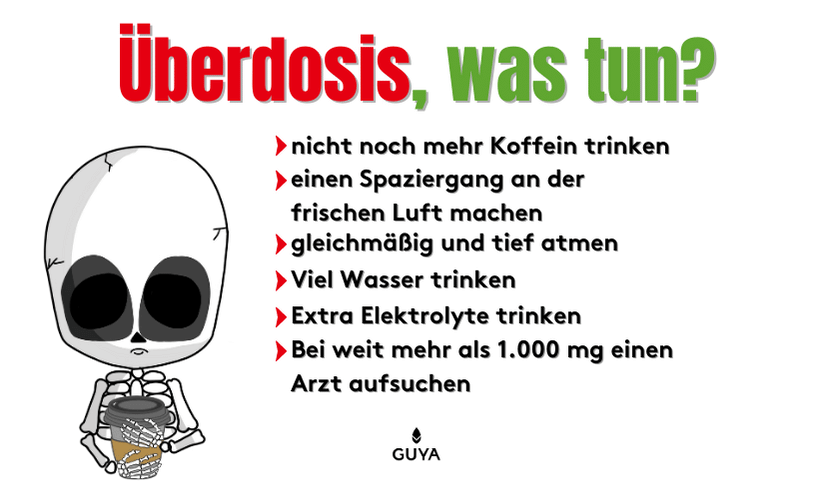
6.2. Caffeine dependency
Strictly speaking, caffeine is not a dependent substance in the sense of addictive! By definition an addictive drug must stimulate the brain reward sector and so strongly that the reward circuit is flooded extremely with dopamine.
Sugar z. B. causes exactly that! Caffeine, on the other hand, also stimulates the dopamine committee, but by far not strong enough. It is therefore attributed to the dependent substances in the sense of a dependency. In English "branch"!
The big difference is that an addictive drug hardly enables consumers to solve themselves. A dependency drug makes it difficult for consumers through minor withdrawal symptoms, but in the end this does not have a major impact on physical and psychological conditions.
More on this topic and why Guayusa Despite an extremely high caffeine content, you can find in our detailed Article for comparison of natural caffeine and pure caffeine powder.
7. Caffeine withdrawal
Caffeine withdrawal is not rocket science for the reasons mentioned, but of course not just so done. The getting used to the body is without question, which is why there can be withdrawal symptoms when you leave your morning coffee. Again, the note that this is the case with Guayusa is much milder, almost not noticeable. Guayusa also has more Health advantages.
7.1. Symptoms by withdrawal
Here are some symptoms that you could feel through a withdrawal if you have consumed a higher dose every day. You can also find some of them in the side effects.
- irritability
- Headache
- Sloppiness
- fears
- reduced concentration
- Little energy in general
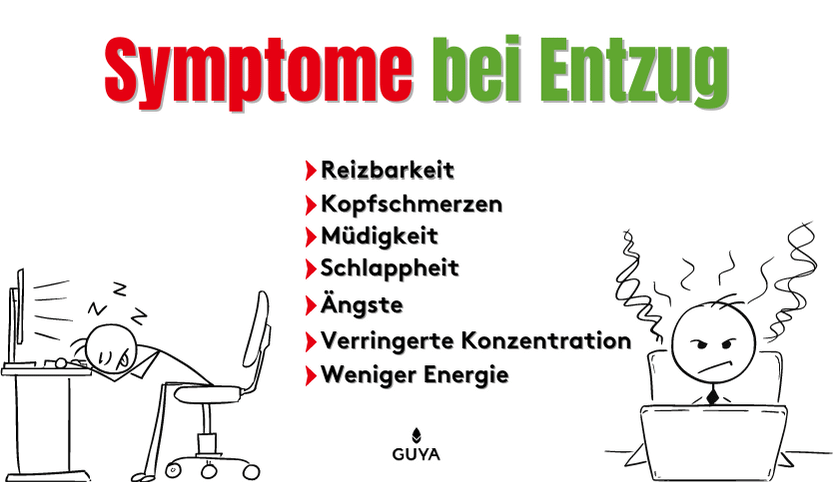
9. Which tea has how much caffeine?
In our still more extensive e-book on the subject of caffeinated plants and their effect You can find more information. You can download it for free or to everyone Order Pack for free. Here we would still like to give you an overview of the most famous teas.
9.1. Guayusa tea
For our customers is Guayusa Nothing new, but maybe you have never heard of this plant? An extensive article about Guayusa You can find separate articles here and separate articles Effect and preparation we also linked you.
Guayusa is the most caffeinated leaf in the world. With up to 7.6% and all sorts of other Active ingredients How Antioxidants is Guayusa Even healthier than green tea.
9.2. mate tea
One of the most famous guards, but probably more by cold drinks than through the actual tea.
Yerba mate tea is in the broadest sense Guayusa Related, but doesn't have as much caffeine as many always think. You can find an article on the content here and one Articles on effect in comparison We also linked you to other plants.
9.3. Green tea, Matcha, black tea
According to the definition, "tea" is only the infusion of the tea plant. Whether green, black, white or the tea powder Matcha, all varieties come from the same plant and are refined by different processing.
Each variety has a different caffeine content, so that the range of 0.1% with really bad bag tea can reach up to 3.9% and over 5% in a few varieties.
You can find out in our Articles on green tea time time.
10. Conclusion
Caffeine is loud drug The most popular drug worldwide. In our opinion, the widespread and use is due to the positive effects from which we humans benefit both in terms of physical fitness and mental performance.
Nevertheless, the possible disadvantages cannot be made on the outside, and of course, as with any other drug, should always be named and observed. Because caffeine carries the risk of an overdose, even if this is extremely unlikely.
The many advantages of the active ingredient, if it is consumed in a natural form, place the disadvantages, which usually only occur under certain conditions.
In our other articles you can do more about the Pretend and Disadvantage Read for health and deal deeply with what the Differences between artificial and pure caffeine powder are. We also have for everyone Pregnant and quiet mothers written a more extensive article.







